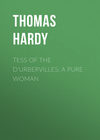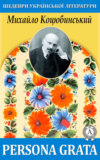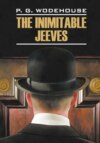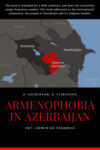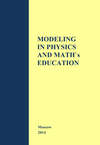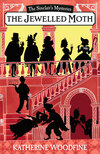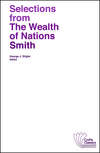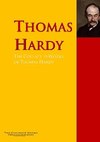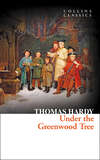Kitabı oku: «Tess of the d'Urbervilles: A Pure Woman», sayfa 29
LIV
In a quarter of an hour Clare was leaving the house, whence his mother watched his thin figure as it disappeared into the street. He had declined to borrow his father's old mare, well knowing of its necessity to the household. He went to the inn, where he hired a trap, and could hardly wait during the harnessing. In a very few minutes after, he was driving up the hill out of the town which, three or four months earlier in the year, Tess had descended with such hopes and ascended with such shattered purposes.
Benvill Lane soon stretched before him, its hedges and trees purple with buds; but he was looking at other things, and only recalled himself to the scene sufficiently to enable him to keep the way. In something less than an hour-and-a-half he had skirted the south of the King's Hintock estates and ascended to the untoward solitude of Cross-in-Hand, the unholy stone whereon Tess had been compelled by Alec d'Urberville, in his whim of reformation, to swear the strange oath that she would never wilfully tempt him again. The pale and blasted nettle-stems of the preceding year even now lingered nakedly in the banks, young green nettles of the present spring growing from their roots.
Thence he went along the verge of the upland overhanging the other Hintocks, and, turning to the right, plunged into the bracing calcareous region of Flintcomb-Ash, the address from which she had written to him in one of the letters, and which he supposed to be the place of sojourn referred to by her mother. Here, of course, he did not find her; and what added to his depression was the discovery that no "Mrs Clare" had ever been heard of by the cottagers or by the farmer himself, though Tess was remembered well enough by her Christian name. His name she had obviously never used during their separation, and her dignified sense of their total severance was shown not much less by this abstention than by the hardships she had chosen to undergo (of which he now learnt for the first time) rather than apply to his father for more funds.
From this place they told him Tess Durbeyfield had gone, without due notice, to the home of her parents on the other side of Blackmoor, and it therefore became necessary to find Mrs Durbeyfield. She had told him she was not now at Marlott, but had been curiously reticent as to her actual address, and the only course was to go to Marlott and inquire for it. The farmer who had been so churlish with Tess was quite smooth-tongued to Clare, and lent him a horse and man to drive him towards Marlott, the gig he had arrived in being sent back to Emminster; for the limit of a day's journey with that horse was reached.
Clare would not accept the loan of the farmer's vehicle for a further distance than to the outskirts of the Vale, and, sending it back with the man who had driven him, he put up at an inn, and next day entered on foot the region wherein was the spot of his dear Tess's birth. It was as yet too early in the year for much colour to appear in the gardens and foliage; the so-called spring was but winter overlaid with a thin coat of greenness, and it was of a parcel with his expectations.
The house in which Tess had passed the years of her childhood was now inhabited by another family who had never known her. The new residents were in the garden, taking as much interest in their own doings as if the homestead had never passed its primal time in conjunction with the histories of others, beside which the histories of these were but as a tale told by an idiot. They walked about the garden paths with thoughts of their own concerns entirely uppermost, bringing their actions at every moment in jarring collision with the dim ghosts behind them, talking as though the time when Tess lived there were not one whit intenser in story than now. Even the spring birds sang over their heads as if they thought there was nobody missing in particular.
On inquiry of these precious innocents, to whom even the name of their predecessors was a failing memory, Clare learned that John Durbeyfield was dead; that his widow and children had left Marlott, declaring that they were going to live at Kingsbere, but instead of doing so had gone on to another place they mentioned. By this time Clare abhorred the house for ceasing to contain Tess, and hastened away from its hated presence without once looking back.
His way was by the field in which he had first beheld her at the dance. It was as bad as the house – even worse. He passed on through the churchyard, where, amongst the new headstones, he saw one of a somewhat superior design to the rest. The inscription ran thus:
In memory of John Durbeyfield, rightly d'Urberville, of the once powerful family of that Name, and Direct Descendant through an illustrious Line from Sir Pagan d'Urberville, one of the Knights of the Conqueror. Died March 10th, 18 —
How Are the Mighty Fallen
Some man, apparently the sexton, had observed Clare standing there, and drew nigh. "Ah, sir, now that's a man who didn't want to lie here, but wished to be carried to Kingsbere, where his ancestors be."
"And why didn't they respect his wish?"
"Oh – no money. Bless your soul, sir, why – there, I wouldn't wish to say it everywhere, but – even this headstone, for all the flourish wrote upon en, is not paid for."
"Ah, who put it up?"
The man told the name of a mason in the village, and, on leaving the churchyard, Clare called at the mason's house. He found that the statement was true, and paid the bill. This done, he turned in the direction of the migrants.
The distance was too long for a walk, but Clare felt such a strong desire for isolation that at first he would neither hire a conveyance nor go to a circuitous line of railway by which he might eventually reach the place. At Shaston, however, he found he must hire; but the way was such that he did not enter Joan's place till about seven o'clock in the evening, having traversed a distance of over twenty miles since leaving Marlott.
The village being small he had little difficulty in finding Mrs Durbeyfield's tenement, which was a house in a walled garden, remote from the main road, where she had stowed away her clumsy old furniture as best she could. It was plain that for some reason or other she had not wished him to visit her, and he felt his call to be somewhat of an intrusion. She came to the door herself, and the light from the evening sky fell upon her face.
This was the first time that Clare had ever met her, but he was too preoccupied to observe more than that she was still a handsome woman, in the garb of a respectable widow. He was obliged to explain that he was Tess's husband, and his object in coming there, and he did it awkwardly enough. "I want to see her at once," he added. "You said you would write to me again, but you have not done so."
"Because she've not come home," said Joan.
"Do you know if she is well?"
"I don't. But you ought to, sir," said she.
"I admit it. Where is she staying?"
From the beginning of the interview Joan had disclosed her embarrassment by keeping her hand to the side of her cheek.
"I – don't know exactly where she is staying," she answered. "She was – but – "
"Where was she?"
"Well, she is not there now."
In her evasiveness she paused again, and the younger children had by this time crept to the door, where, pulling at his mother's skirts, the youngest murmured —
"Is this the gentleman who is going to marry Tess?"
"He has married her," Joan whispered. "Go inside."
Clare saw her efforts for reticence, and asked —
"Do you think Tess would wish me to try and find her? If not, of course – "
"I don't think she would."
"Are you sure?"
"I am sure she wouldn't."
He was turning away; and then he thought of Tess's tender letter.
"I am sure she would!" he retorted passionately. "I know her better than you do."
"That's very likely, sir; for I have never really known her."
"Please tell me her address, Mrs Durbeyfield, in kindness to a lonely wretched man!" Tess's mother again restlessly swept her cheek with her vertical hand, and seeing that he suffered, she at last said, is a low voice —
"She is at Sandbourne."
"Ah – where there? Sandbourne has become a large place, they say."
"I don't know more particularly than I have said – Sandbourne. For myself, I was never there."
It was apparent that Joan spoke the truth in this, and he pressed her no further.
"Are you in want of anything?" he said gently.
"No, sir," she replied. "We are fairly well provided for."
Without entering the house Clare turned away. There was a station three miles ahead, and paying off his coachman, he walked thither. The last train to Sandbourne left shortly after, and it bore Clare on its wheels.
LV
At eleven o'clock that night, having secured a bed at one of the hotels and telegraphed his address to his father immediately on his arrival, he walked out into the streets of Sandbourne. It was too late to call on or inquire for any one, and he reluctantly postponed his purpose till the morning. But he could not retire to rest just yet.
This fashionable watering-place, with its eastern and its western stations, its piers, its groves of pines, its promenades, and its covered gardens, was, to Angel Clare, like a fairy place suddenly created by the stroke of a wand, and allowed to get a little dusty. An outlying eastern tract of the enormous Egdon Waste was close at hand, yet on the very verge of that tawny piece of antiquity such a glittering novelty as this pleasure city had chosen to spring up. Within the space of a mile from its outskirts every irregularity of the soil was prehistoric, every channel an undisturbed British trackway; not a sod having been turned there since the days of the Caesars. Yet the exotic had grown here, suddenly as the prophet's gourd; and had drawn hither Tess.
By the midnight lamps he went up and down the winding way of this new world in an old one, and could discern between the trees and against the stars the lofty roofs, chimneys, gazebos, and towers of the numerous fanciful residences of which the place was composed. It was a city of detached mansions; a Mediterranean lounging-place on the English Channel; and as seen now by night it seemed even more imposing than it was.
The sea was near at hand, but not intrusive; it murmured, and he thought it was the pines; the pines murmured in precisely the same tones, and he thought they were the sea.
Where could Tess possibly be, a cottage-girl, his young wife, amidst all this wealth and fashion? The more he pondered, the more was he puzzled. Were there any cows to milk here? There certainly were no fields to till. She was most probably engaged to do something in one of these large houses; and he sauntered along, looking at the chamber-windows and their lights going out one by one, and wondered which of them might be hers.
Conjecture was useless, and just after twelve o'clock he entered and went to bed. Before putting out his light he re-read Tess's impassioned letter. Sleep, however, he could not – so near her, yet so far from her – and he continually lifted the window-blind and regarded the backs of the opposite houses, and wondered behind which of the sashes she reposed at that moment.
He might almost as well have sat up all night. In the morning he arose at seven, and shortly after went out, taking the direction of the chief post-office. At the door he met an intelligent postman coming out with letters for the morning delivery.
"Do you know the address of a Mrs Clare?" asked Angel. The postman shook his head.
Then, remembering that she would have been likely to continue the use of her maiden name, Clare said —
"Of a Miss Durbeyfield?"
"Durbeyfield?"
This also was strange to the postman addressed.
"There's visitors coming and going every day, as you know, sir," he said; "and without the name of the house 'tis impossible to find 'em."
One of his comrades hastening out at that moment, the name was repeated to him.
"I know no name of Durbeyfield; but there is the name of d'Urberville at The Herons," said the second.
"That's it!" cried Clare, pleased to think that she had reverted to the real pronunciation. "What place is The Herons?"
"A stylish lodging-house. 'Tis all lodging-houses here, bless 'ee."
Clare received directions how to find the house, and hastened thither, arriving with the milkman. The Herons, though an ordinary villa, stood in its own grounds, and was certainly the last place in which one would have expected to find lodgings, so private was its appearance. If poor Tess was a servant here, as he feared, she would go to the back-door to that milkman, and he was inclined to go thither also. However, in his doubts he turned to the front, and rang.
The hour being early, the landlady herself opened the door. Clare inquired for Teresa d'Urberville or Durbeyfield.
"Mrs d'Urberville?"
"Yes."
Tess, then, passed as a married woman, and he felt glad, even though she had not adopted his name.
"Will you kindly tell her that a relative is anxious to see her?"
"It is rather early. What name shall I give, sir?"
"Angel."
"Mr Angel?"
"No; Angel. It is my Christian name. She'll understand."
"I'll see if she is awake."
He was shown into the front room – the dining-room – and looked out through the spring curtains at the little lawn, and the rhododendrons and other shrubs upon it. Obviously her position was by no means so bad as he had feared, and it crossed his mind that she must somehow have claimed and sold the jewels to attain it. He did not blame her for one moment. Soon his sharpened ear detected footsteps upon the stairs, at which his heart thumped so painfully that he could hardly stand firm. "Dear me! what will she think of me, so altered as I am!" he said to himself; and the door opened.
Tess appeared on the threshold – not at all as he had expected to see her – bewilderingly otherwise, indeed. Her great natural beauty was, if not heightened, rendered more obvious by her attire. She was loosely wrapped in a cashmere dressing-gown of gray-white, embroidered in half-mourning tints, and she wore slippers of the same hue. Her neck rose out of a frill of down, and her well-remembered cable of dark-brown hair was partially coiled up in a mass at the back of her head and partly hanging on her shoulder – the evident result of haste.
He had held out his arms, but they had fallen again to his side; for she had not come forward, remaining still in the opening of the doorway. Mere yellow skeleton that he was now, he felt the contrast between them, and thought his appearance distasteful to her.
"Tess!" he said huskily, "can you forgive me for going away? Can't you – come to me? How do you get to be – like this?"
"It is too late," said she, her voice sounding hard through the room, her eyes shining unnaturally.
"I did not think rightly of you – I did not see you as you were!" he continued to plead. "I have learnt to since, dearest Tessy mine!"
"Too late, too late!" she said, waving her hand in the impatience of a person whose tortures cause every instant to seem an hour. "Don't come close to me, Angel! No – you must not. Keep away."
"But don't you love me, my dear wife, because I have been so pulled down by illness? You are not so fickle – I am come on purpose for you – my mother and father will welcome you now!"
"Yes – O, yes, yes! But I say, I say it is too late."
She seemed to feel like a fugitive in a dream, who tries to move away, but cannot. "Don't you know all – don't you know it? Yet how do you come here if you do not know?"
"I inquired here and there, and I found the way."
"I waited and waited for you," she went on, her tones suddenly resuming their old fluty pathos. "But you did not come! And I wrote to you, and you did not come! He kept on saying you would never come any more, and that I was a foolish woman. He was very kind to me, and to mother, and to all of us after father's death. He – "
"I don't understand."
"He has won me back to him."
Clare looked at her keenly, then, gathering her meaning, flagged like one plague-stricken, and his glance sank; it fell on her hands, which, once rosy, were now white and more delicate.
She continued —
"He is upstairs. I hate him now, because he told me a lie – that you would not come again; and you have come! These clothes are what he's put upon me: I didn't care what he did wi' me! But – will you go away, Angel, please, and never come any more?"
They stood fixed, their baffled hearts looking out of their eyes with a joylessness pitiful to see. Both seemed to implore something to shelter them from reality.
"Ah – it is my fault!" said Clare.
But he could not get on. Speech was as inexpressive as silence. But he had a vague consciousness of one thing, though it was not clear to him till later; that his original Tess had spiritually ceased to recognize the body before him as hers – allowing it to drift, like a corpse upon the current, in a direction dissociated from its living will.
A few instants passed, and he found that Tess was gone. His face grew colder and more shrunken as he stood concentrated on the moment, and a minute or two after, he found himself in the street, walking along he did not know whither.
LVI
Mrs Brooks, the lady who was the householder at The Herons and owner of all the handsome furniture, was not a person of an unusually curious turn of mind. She was too deeply materialized, poor woman, by her long and enforced bondage to that arithmetical demon Profit-and-Loss, to retain much curiousity for its own sake, and apart from possible lodgers' pockets. Nevertheless, the visit of Angel Clare to her well-paying tenants, Mr and Mrs d'Urberville, as she deemed them, was sufficiently exceptional in point of time and manner to reinvigorate the feminine proclivity which had been stifled down as useless save in its bearings to the letting trade.
Tess had spoken to her husband from the doorway, without entering the dining-room, and Mrs Brooks, who stood within the partly-closed door of her own sitting-room at the back of the passage, could hear fragments of the conversation – if conversation it could be called – between those two wretched souls. She heard Tess re-ascend the stairs to the first floor, and the departure of Clare, and the closing of the front door behind him. Then the door of the room above was shut, and Mrs Brooks knew that Tess had re-entered her apartment. As the young lady was not fully dressed, Mrs Brooks knew that she would not emerge again for some time.
She accordingly ascended the stairs softly, and stood at the door of the front room – a drawing-room, connected with the room immediately behind it (which was a bedroom) by folding-doors in the common manner. This first floor, containing Mrs Brooks's best apartments, had been taken by the week by the d'Urbervilles. The back room was now in silence; but from the drawing-room there came sounds.
All that she could at first distinguish of them was one syllable, continually repeated in a low note of moaning, as if it came from a soul bound to some Ixionian wheel —
"O – O – O!"
Then a silence, then a heavy sigh, and again —
"O – O – O!"
The landlady looked through the keyhole. Only a small space of the room inside was visible, but within that space came a corner of the breakfast table, which was already spread for the meal, and also a chair beside. Over the seat of the chair Tess's face was bowed, her posture being a kneeling one in front of it; her hands were clasped over her head, the skirts of her dressing-gown and the embroidery of her night-gown flowed upon the floor behind her, and her stockingless feet, from which the slippers had fallen, protruded upon the carpet. It was from her lips that came the murmur of unspeakable despair.
Then a man's voice from the adjoining bedroom —
"What's the matter?"
She did not answer, but went on, in a tone which was a soliloquy rather than an exclamation, and a dirge rather than a soliloquy. Mrs Brooks could only catch a portion:
"And then my dear, dear husband came home to me … and I did not know it! … And you had used your cruel persuasion upon me … you did not stop using it – no – you did not stop! My little sisters and brothers and my mother's needs – they were the things you moved me by … and you said my husband would never come back – never; and you taunted me, and said what a simpleton I was to expect him! … And at last I believed you and gave way! … And then he came back! Now he is gone. Gone a second time, and I have lost him now for ever … and he will not love me the littlest bit ever any more – only hate me! … O yes, I have lost him now – again because of – you!" In writhing, with her head on the chair, she turned her face towards the door, and Mrs Brooks could see the pain upon it, and that her lips were bleeding from the clench of her teeth upon them, and that the long lashes of her closed eyes stuck in wet tags to her cheeks. She continued: "And he is dying – he looks as if he is dying! … And my sin will kill him and not kill me! … O, you have torn my life all to pieces … made me be what I prayed you in pity not to make me be again! … My own true husband will never, never – O God – I can't bear this! – I cannot!"
There were more and sharper words from the man; then a sudden rustle; she had sprung to her feet. Mrs Brooks, thinking that the speaker was coming to rush out of the door, hastily retreated down the stairs.
She need not have done so, however, for the door of the sitting-room was not opened. But Mrs Brooks felt it unsafe to watch on the landing again, and entered her own parlour below.
She could hear nothing through the floor, although she listened intently, and thereupon went to the kitchen to finish her interrupted breakfast. Coming up presently to the front room on the ground floor she took up some sewing, waiting for her lodgers to ring that she might take away the breakfast, which she meant to do herself, to discover what was the matter if possible. Overhead, as she sat, she could now hear the floorboards slightly creak, as if some one were walking about, and presently the movement was explained by the rustle of garments against the banisters, the opening and the closing of the front door, and the form of Tess passing to the gate on her way into the street. She was fully dressed now in the walking costume of a well-to-do young lady in which she had arrived, with the sole addition that over her hat and black feathers a veil was drawn.
Mrs Brooks had not been able to catch any word of farewell, temporary or otherwise, between her tenants at the door above. They might have quarrelled, or Mr d'Urberville might still be asleep, for he was not an early riser.
She went into the back room, which was more especially her own apartment, and continued her sewing there. The lady lodger did not return, nor did the gentleman ring his bell. Mrs Brooks pondered on the delay, and on what probable relation the visitor who had called so early bore to the couple upstairs. In reflecting she leant back in her chair.
As she did so her eyes glanced casually over the ceiling till they were arrested by a spot in the middle of its white surface which she had never noticed there before. It was about the size of a wafer when she first observed it, but it speedily grew as large as the palm of her hand, and then she could perceive that it was red. The oblong white ceiling, with this scarlet blot in the midst, had the appearance of a gigantic ace of hearts.
Mrs Brooks had strange qualms of misgiving. She got upon the table, and touched the spot in the ceiling with her fingers. It was damp, and she fancied that it was a blood stain.
Descending from the table, she left the parlour, and went upstairs, intending to enter the room overhead, which was the bedchamber at the back of the drawing-room. But, nerveless woman as she had now become, she could not bring herself to attempt the handle. She listened. The dead silence within was broken only by a regular beat.
Drip, drip, drip.
Mrs Brooks hastened downstairs, opened the front door, and ran into the street. A man she knew, one of the workmen employed at an adjoining villa, was passing by, and she begged him to come in and go upstairs with her; she feared something had happened to one of her lodgers. The workman assented, and followed her to the landing.
She opened the door of the drawing-room, and stood back for him to pass in, entering herself behind him. The room was empty; the breakfast – a substantial repast of coffee, eggs, and a cold ham – lay spread upon the table untouched, as when she had taken it up, excepting that the carving-knife was missing. She asked the man to go through the folding-doors into the adjoining room.
He opened the doors, entered a step or two, and came back almost instantly with a rigid face. "My good God, the gentleman in bed is dead! I think he has been hurt with a knife – a lot of blood had run down upon the floor!"
The alarm was soon given, and the house which had lately been so quiet resounded with the tramp of many footsteps, a surgeon among the rest. The wound was small, but the point of the blade had touched the heart of the victim, who lay on his back, pale, fixed, dead, as if he had scarcely moved after the infliction of the blow. In a quarter of an hour the news that a gentleman who was a temporary visitor to the town had been stabbed in his bed, spread through every street and villa of the popular watering-place.
